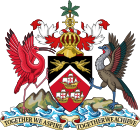The history of Trinidad and Tobago begins with the settlements of the islands by Indigenous First Peoples. Trinidad was visited by Christopher Columbus on his third voyage in 1498,, and claimed in the name of Spain. Trinidad was administered by Spanish hands until 1797, but it was largely settled by French colonists. Tobago changed hands between the British, French, Dutch, and Courlanders, but eventually ended up in British hands following the second Treaty of Paris (1814). In 1889, the two islands were incorporated into a single political entity. Trinidad and Tobago obtained its independence from the British Empire in 1962 and became a republic in 1976.

The politics of Trinidad and Tobago function within the framework of a unitary state regulated by a parliamentary democracy modelled on that of the United Kingdom of Great Britain and Northern Ireland, from which the country gained its independence in 1962. Under the 1976 republican Constitution, the monarch was replaced as head of state by a President chosen by an electoral college composed of the members of the bicameral Parliament, consisting of the Senate and the House of Representatives.

Patrick Augustus Mervyn Manning was a Trinidad and Tobago politician who was the fourth prime minister of Trinidad and Tobago; his terms ran from 17 December 1991 to 9 November 1995 and from 24 December 2001 to 26 May 2010. He was also the political leader of the People's National Movement (PNM) from 1987 to 2010. A geologist by training, Manning served as Member of Parliament for the San Fernando East constituency from 1971 until 2015 when he was replaced by Randall Mitchell, but with the seat in 2020 being won by his son Brian Manning. Patrick Manning was the longest-serving member of the House of Representatives. He was the Leader of the Opposition from 1986 to 1990 and again from 1995 to 2001.
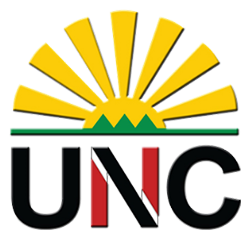
The United National Congress is one of two major political parties in Trinidad and Tobago and the current parliamentary opposition. The UNC is a centre-left party. It was founded in 1989 by Basdeo Panday, a Trinidadian lawyer, economist, trade unionist, and actor after a split in the ruling National Alliance for Reconstruction (NAR). After spending six years in opposition, the UNC won control of the government in 1995, initially in coalition with the NAR and later on its own. In the 2000 general election, the UNC won an absolute majority in the Parliament. In 2001, a split in the party caused the UNC to lose its parliamentary majority and control of the government. From 2001 to 2010, the UNC was once again Parliamentary Opposition party. In May 2010, the UNC returned to government as the majority party in the People's Partnership. The UNC's Political Leader, Kamla Persad-Bissessar, was sworn in as the first female Prime Minister of Trinidad and Tobago. Kamla Persad-Bissessar was Prime Minister from 2010 until 2015.

The People's National Movement (PNM) is the longest-serving and oldest active political party in Trinidad and Tobago. The party has dominated national and local politics for much of Trinidad and Tobago's history, contesting all elections since 1956 serving as the nation's governing party or on four occasions, the main opposition. It is one out of the country's two main political parties. There have been four PNM Prime Ministers and multiple ministries. The party espouses the principles of liberalism and generally sits at the centre to centre-left of the political spectrum.

The Organisation for National Reconstruction (ONR) was a political party in Trinidad and Tobago. The party received the second-highest number of votes in the 1981 general elections, but failed to win a seat. Prior to the 1986 elections it merged into the new National Alliance for Reconstruction.

The Tobago House of Assembly (THA) is a unicameral devolved legislative body responsible for the island of Tobago within the unitary state of Trinidad and Tobago. The THA was re-established in 1980 to rectify some of the disparities in the relationship between the two islands; a prior body of the same name existed from 1768 to 1874. In addition to the normal local government functions, the THA handles many of the responsibilities of the central government, but has limited ability to collect taxes and to impose local law or zoning regulations. At the helm of the Assembly Legislature is the Presiding Officer with the fifteen elected assemblymen, and four appointed councillors. Three of the councillors are appointed on the advice on the Chief Secretary and one on the advice of the Minority Leader. The Chief Secretary is the leader of the majority party in the assembly and is at the helm of the Executive arm of the THA.

The Democratic Action Congress (DAC) was a Tobago-based political party in Trinidad and Tobago.

The Democratic Labour Party was the main opposition party in Trinidad and Tobago from 1957 till 1976. That party was the party which opposed the People's National Movement (PNM) at the time of Independence. After several splits brought about by leadership struggles, the party lost its hold on the Indo-Trinidadian community in the 1976 General Elections and was displaced in parliament by the United Labour Front under the leadership of Basdeo Panday, a former DLP senator. The party was the representative of the ethnic Indian community in the country; however Indian Muslims and Christians were said to be less loyal to the party than Indian Hindus.
Ralph Maraj is a Trinidad and Tobago politician, actor, playwright, and teacher. He served as Minister of Foreign Affairs under a People's National Movement (PNM) administration, Minister of Communication and Information Technology under a United National Congress (UNC) administration, and was a founding member of National Team Unity before returning to the PNM to work as a speech writer for Prime Minister Patrick Manning. Prior to entering politics in 1991, Maraj worked as a teacher at Naparima College in San Fernando. He also attended that school. He wrote several plays, the most successful being Cynthia Sweetness. Maraj also starred in the movies The Right and the Wrong (1970) and Bim (1974), described by Bruce Paddington as "one of the most important films to be produced in Trinidad and Tobago".
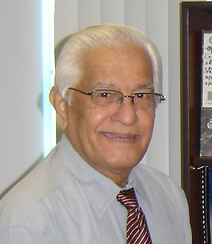
Basdeo Panday was a Trinidadian and Tobagonian statesman, lawyer, politician, trade unionist, economist, and actor who served as the fifth Prime Minister of Trinidad and Tobago from 1995 to 2001. He was the first person of Indian descent along with being the first Hindu to hold the office of Prime Minister of Trinidad and Tobago. He was first elected to Parliament in 1976 as the Member for Couva North, Panday served as Leader of the Opposition four times between 1976 and 2010 and was a founding member of the United Labour Front (ULF), the National Alliance for Reconstruction (NAR), and the United National Congress (UNC). He served as leader of the ULF and UNC, and was President General of the All Trinidad Sugar and General Workers' Trade Union from 1973 to 1995.

The Congress of the People (COP) is a political party in Trinidad and Tobago. Its current political leader is Kirt Sinnette. Its symbol is the "Circle of Circles".

Early general elections were held in Trinidad and Tobago on 7 October 2002, after People's National Movement leader Patrick Manning had failed to secure a majority in the hung parliament produced by the 2001 elections. This time the PNM was able to secure a majority, winning 20 of the 36 seats. Voter turnout was 69.6%.

Early general elections were held in Trinidad and Tobago on 10 December 2001, after the ruling United National Congress lost its majority in the House of Representatives following four defections. However, the election results saw the UNC and the People's National Movement both win 18 seats. Although the UNC received the most votes, President A. N. R. Robinson nominated PNM leader Patrick Manning as Prime Minister. Voter turnout was 66.1%.

The Independent Liberal Party was a political party of Trinidad and Tobago. It was formed in July 2013, after Jack Warner was not reselected as the candidate for the Chaguanas West by-election for the United National Congress (UNC) party. It was launched at a political rally, in Jubilee Grounds, Pierre Road, Chaguanas.
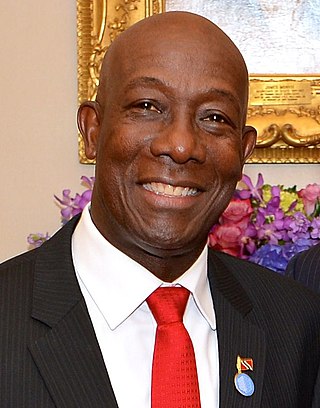
General elections were held in Trinidad and Tobago on 7 September 2015. The date of the general elections was announced by Prime Minister Kamla Persad-Bissessar on 13 June 2015. The result was a victory for the opposition People's National Movement, which received 52% of the vote and won 23 of the 41 seats in the House of Representatives.

On Monday November 28, 2016, local elections were held in Trinidad, the bigger of the two main islands of Caribbean island state Trinidad and Tobago. The elections were held slightly more than one month later than originally planned. They were held to select the membership of 14 local authorities, with representatives elected from 137 single-member districts across the country. The entire membership of Trinidad's local government was renewed as a result of these elections, with the previous set of local representatives having been elected in 2013. The elections came roughly a year following the 2015 parliamentary general election.
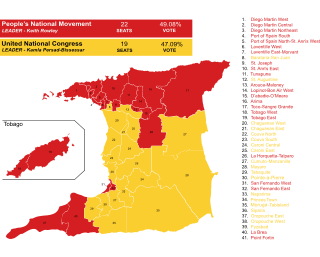
General elections were held in Trinidad and Tobago on Monday, 10 August 2020, to elect 41 members to the 12th Trinidad and Tobago Republican Parliament. It was the 14th election since gaining independence from the United Kingdom in 1962 and the 22nd national election in Trinidad and Tobago ever. Tracy Davidson-Celestine, political leader of the Tobago Council of the People's National Movement (PNM) became the first woman to lead a Tobagonian political party with representation in the House of Representatives. Additionally, two of the three largest parties elected in 2015, the United National Congress (UNC) and the Congress of the People (COP), were led by women.

The Progressive Party is a political party in Trinidad and Tobago. The party was founded on June 16, 2019 by former independent senator Nikoli Edwards to contest the 2020 Trinidad and Tobago general election. The Progressives currently do not hold any seats in the House of Representatives, Regional municipalities, Regional corporations or in the Tobago House of Assembly.
